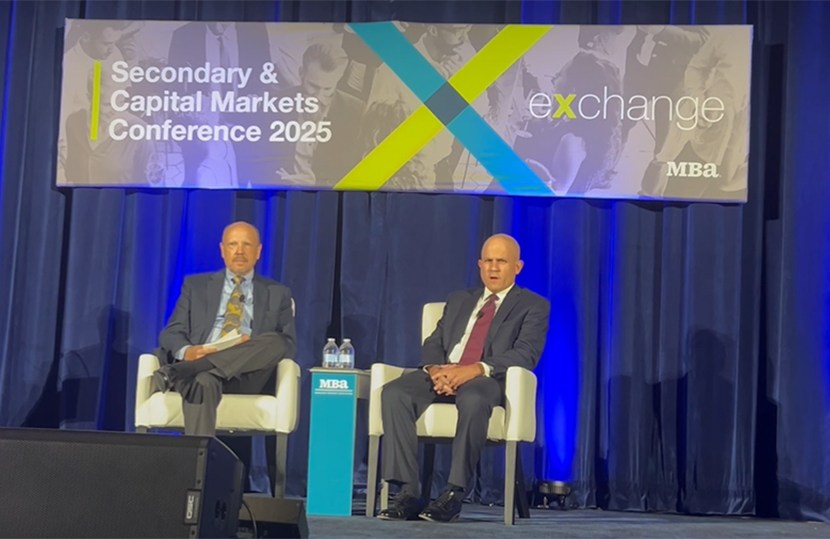
Ginnie Mae’s Joseph Gormley Outlines Priorities: Stability, Adaptability, Efficiency

(From left: Pete Mills and Joseph Gormley)
NEW YORK–New Ginnie Mae Executive Vice President and Chief Operating Officer Joseph Gormley described his goals in a conversation with Mortgage Bankers Association Senior Vice President for Residential Policy and Strategic Industry Engagement Pete Mills during a session at MBA’s Secondary and Capital Markets Conference.
“I’ve organized my priorities around three key themes: stability, adaptability and efficiency,” Gormley said.
He said the stability goal isn’t so much a project or initiative as much as ensuring that Ginnie Mae continues to be a stabilizing force and fulfills its unique role in the industry.
As for adaptability, Gormely pointed to liquidity, noting that Ginnie Mae is “looking at it with a fresh lens, figuring out what we can do to ensure more private capital is flowing through the Ginnie Mae ecosystem.”
Also on the subject of adaptability, he said that Ginnie Mae is looking at moving from a monthly liquidation file to a daily liquidation file.
Looking at efficiency, Gormley pointed to cybersecurity as a key priority. And, he gave the example of Ginnie Mae’s digital collateral project, which has been an ongoing work in progress, and the potential implementation of AI tools.
Gormley also assured the audience that the organization is in a good place in terms of staffing, despite recent federal workforce cuts.
Mills asked Gormley about current trends he’s seeing on delinquencies; Gormley acknowledged they’ve increased in recent months, although he also said he thinks there’s been a bit of a plateau.
“Obviously there are some headwinds for the American consumer, particularly increasing taxes and insurance payments that are affecting many areas of the country,” he said. He pointed to student loans as something that Ginnie Mae is watching closely.
“And then there’s this emerging issue of what I would call invisible credit, or “off-credit-report debts”…[like] buy now, pay later, and certainly other things that don’t show up on a credit report,” he said. “And so we’re looking very carefully. I wouldn’t say concerned, but we continue to look very carefully at those types of things.”
Gormley also expressed confidence in the Ginnie Mae issuer base. “The issuer base has changed dramatically over the last 15 years. From more bank-centric to now we’re very heavily weighted in the nonbank space,” he said. “But I think most of our issuers have gone through a maturation process over the last decade. We feel very good about their operations.”
Mills asked Gormley what MBA members can do to help Ginnie Mae succeed with its current goals.
Gormley pointed to the importance of communication and information from those working day-to-day in the industry. “The more information we have about the market, the more information together about the issues that issuers are facing,” he said. “You know, things that you think are around the corner, things that you think Ginnie should be focusing on. Ideas you have about the securities program. We’re really all ears.”
